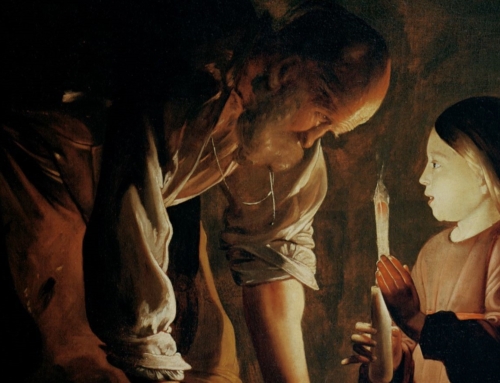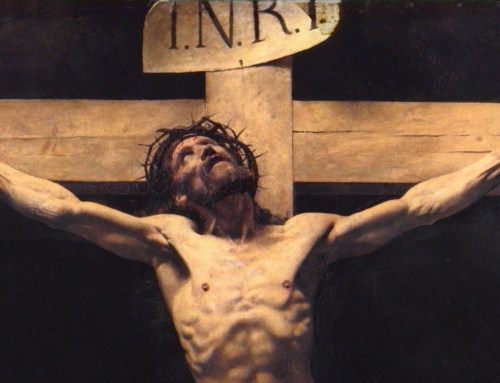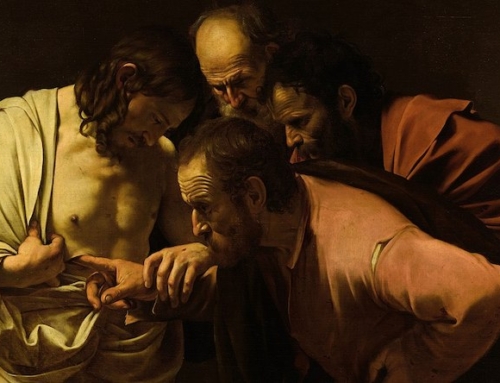Why sacrifice?
Imagine yourself on a pilgrimage. Not to Lourdes or Fatima, but wandering in the Sinai desert en route to the promised land of Canaan. You’re told by Moses and company that the land you’re aiming for is a great land, one flowing with milk, honey, and other delights. Yet as good as the goal sounds, it’s hard to think of the end when your stops along the way include desert-fatigue and the sword of Amalek. The question might arise, why put up with this at all? Couldn’t God bring me to the promised land without all this hassle?
Now imagine yourself in the midst of the Lenten season, with an overambitious list of penances and a waning fervor to do them. The question might arise, why do them at all? Isn’t there any easier way to sainthood than the hassle of penance and sacrifice?
I think we have trouble keeping up Lenten penances because we fail to see their meaning and depth. Faulty approaches to penance usually involve refraining from penance altogether, or overdoing it. The first fails to see that sacrifice can really change us, while the second’s scatter-shot method leaves us equally scattered and enervated from its misdirected zeal.
Faulty approaches to penance miss the mark because they fail to see sacrifice as something interior. If something isn’t interior to a person, then it will lack depth. And if it lacks depth, then there is little chance it will have a lasting, virtuous effect in our life.
So then how do you give sacrifice an interior depth?
Desire. When preaching on the First Letter of John, St. Augustine stated that “the entire life of a good Christian is a holy desire” (Sermons on 1 John 4, 6). But what must we desire to give sacrifice and penance meaning?
Before anything else, you must desire the invisible God who is Love itself. When you love something, but don’t see what you love, you desire it more for not having it completely. God is an invisible reality that no one has ever seen before (1 Jn 4:12). Yet the invisible God is also the God who is Love itself (1 Jn 4:8). Therefore, loving the invisible God stretches out our desire and gives a depth to our soul that God can fill with Himself.
But God who is Love has not remained invisible. Love itself has taken human form, with hands and feet and a face, who is named Jesus. Following your desire for the invisible God, desire a deepening of your love for Jesus, who is God made flesh and Love made visible. Speaking of this deepening love for Jesus, St. Augustine compares our hearts to a field in which God wishes to plant Himself:
God finds the hearts of men to be like a field…. If he finds growth there, he destroys it; if he finds the field cleared, he plants. He wants to plant the tree of love there. And what growth does he want to destroy? Love of the world. Listen to him…If anyone loves the world, the love of the Fathers is not in him (1 John 2:18). (2, 8)
To deepen our love for Jesus is to have Him dwell more deeply in us, like a tree of love planted inside us. But in order for this tree to grow, we need to be emptied of earthly love and attachments. This can only be done by sacrificing these earthly loves by the grace God gives us. This is how God cleanses us to have a deeper love for Him, and this is how our Lenten penances and sacrifices take on a deeper, interior meaning.
Our desire to deepen our love for Jesus doesn’t end in this life. Let your love for Christ become so deep that you desire to be joined to God completely in the next life as well. If we truly have a love for God, we will ultimately not desire our earthly pilgrimage for itself. Instead, we will desire to be joined to God as our good. St. Augustine advises, “Let him [who loves] not love the pilgrimage, let him not love the way. Let everything be bitter apart from him who calls us, until we are joined to him, and let us say what is said in the psalm…: But my good is to be joined to God (Ps 73:28). My entire good is to be freely joined to God” (9, 10).
This Lent, consider your sacrifices and penances not as a list of things to accomplish or achieve, but as a way of stretching out your desire for a homeland that you one day wish to enjoy. As St. Augustine tells us, our home is not here:
This world is to all the faithful who are seeking their homeland what the desert was to the people of Israel. They were indeed wandering the whole time and in search of their homeland, but, since God was leading them, they couldn’t go astray. They experienced delays because they were being exercised, not because they were being forsaken. What God promises us, then, is ineffable sweetness and a good, what the eye has not seen nor the ear heard, nor has it entered into the heart of man (1 Cor 2:9). (7, 1)
✠
Image: Odilon Redon, Reflection







